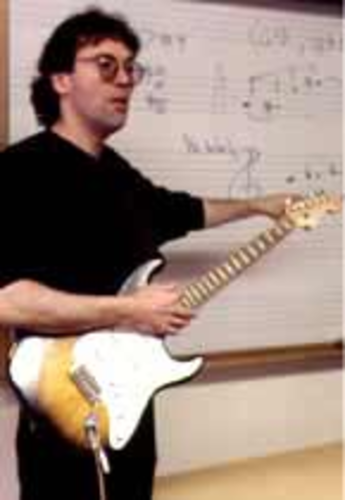Moving toward Guitar Mastery

Professor Jim Kelly, one of Berklee's most sought-after guitar instructors, knows that the best way to learn guitar involves a hands-on approach. Kelly grew up playing in garage bands and had taken a few lessons, but mostly listened to and analyzed recordings. Although he says that attending Berklee filled in a lot of gaps, he's never forgotten the value of hands-on learning that taught him about music in the larger sense.
"Many teachers provide good material," Kelly says, "but if their students don't learn how to plug it into a musical context, it won't be very useful. I go for a practical approach—here's the blues, here are changes, and so on. It's almost more of a trade school attitude. If you want to make fine furniture, you need to learn from someone who's done it, not just look at pictures of chairs and tables in a book."
Helping guitarists find their own voice is one of Kelly's main objectives. He doesn't want to teach people to play like him. He finds material that has enough flexibility that students can play it their own way.
To bring out a student's individuality, Kelly knows the key is to "figure out what musical elements really grab the student, and why. Actually, most players 'hybridize' several styles to create something unique. For example, Bill Frisell would not have fit the 'jazz' mold 20 years ago. You can hear that he has country, rock, and pop influences. He created his own voice from those sounds and adapted it to jazz."
Kelly finds the blues to be a common language. "Whether you're playing a straight blues guitar thing or going in more of a Wes [Montgomery] or [John] Coltrane direction, you learn to play something that feels good over a 12-bar blues. Whether you play something simple or complicated, how you approach the playing defines who you are. You'll learn a lot about a person by just listening to how he or she plays over something standard."
I was curious about whether Kelly had observed any common mistakes in attitude that guitarists make. "Practicing is not like lifting weights. Sure, there's a physical element, but students need to relate to sound as quickly as possible. Figuring out solos as opposed to scales means you're learning actual music. Interpreting Bach inventions might seem technical, but there's music in there. You can do exercises for hours, but ultimately, you'll bore yourself, and that's not good."
For Kelly, teaching is all about feedback; it is not a monologue from teacher to student. "I want to know where students are having trouble, what they like and don't like. No one who comes to me is starting at the beginning. They have had other teachers, or they have spent time learning in some way. What I want to find out is what students have going for them, and how to keep them moving forward."
Guitar Workshop is Kelly's new book and CD combination published by Berklee Press. It is based on a collection of music he uses with his students and will allow Kelly's approach to reach a much wider audience. "Over the years, in teaching private lessons and at seminars, people have asked me to put all my songs and exercises together in one place instead of just photocopying them as needed.
"The object was to make sort of a 'seminar in a box.' The CD has band versions of various tunes to analyze the guitar work, as well as play-along versions with no guitar tracks. But the book avoids a 'level-oriented' approach; levels are mixed within the course. There is some stuff that you definitely have to woodshed, but other sections are easier."
True to Kelly's philosophy, the mix of tunes is eclectic—minor blues à la Kenny Burrell, some Latin material, and Mark Knopfler-ish tunes. One song uses an Etta James-type r&b groove; another features a Joe Pass-type chordal solo behind a saxophone solo. The guitar gets to play more of a keyboard/rhythm part behind the solo—like a horn section. Kelly also incorporates rhythm guitar extensively because he feels rhythm playing is just as important as lead playing.
"I saw Hendrix when I was in high school; his rhythm playing on songs like 'Little Wing' was revolutionary. To me, 'Axis: Bold as Love' wasn't just another rock record. It was something completely new. You can hear that his rhythm playing involved much more than power chords."
Part of the motivation for creating this interactive book and CD is to help students pull all the pieces together. "The typical student has learned some things by ear--some from teachers, some from picking apart albums. What's difficult for them isn't so much learning new concepts. A lot of students, particularly self-taught musicians, know more than they realize but don't know how to apply that knowledge.
"On the other side of the coin is someone who knows lots of theory but hasn't spent time applying it to actual music-making and having fun with it. Much of my approach is about keeping things fun--enjoying the process really helps learning."
You can purchase Jim Kelly's Guitar Workshop by calling Music Dispatch at 1-800-637-2852.
